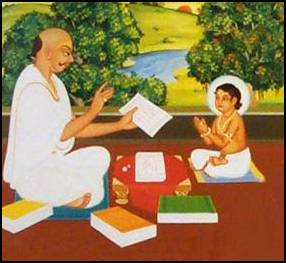Swaminarayan






Swaminarayan (3 April 1781 – 1 June 1830), also known as Sahajanand Swami, was a yogi, and an ascetic whose life and teachings brought a revival of central Hindu practices of dharma, ahimsa (non-violence), brahmacharya (celibacy), and Aparigraha (non-possessiveness). He is believed by followers as a manifestation of God. Swaminarayan was born Ghanshyam Pande in Chhapaiya, Uttar Pradesh, India. He began a seven-year pilgrimage across India as a teenager, adopting the name Nilkanth Varni. Swaminarayan then settled in the state of Gujarat and established a new religious movement characterized by a strict ethic of diet, personal behavior, and social reform.
Early Life[edit]
Swaminarayan was born in a Hindu Brahmin family in 1781. His early years were marked by a series of spiritual quests, which led him to leave home at the age of 11 to embark on a seven-year pilgrimage across the Indian subcontinent. During his travels, he met various sages and ascetics and engaged in deep meditation and spiritual practices.
Teachings and Philosophy[edit]
Swaminarayan's teachings focused on the importance of morality, purity, and devotion to God. He preached against the caste system and advocated for social justice and equality, promoting a community that upheld the values of honesty, non-violence, and vegetarianism. Swaminarayan emphasized the worship of Krishna and considered himself a servant of Krishna. His philosophical foundation was based on the dualism of Jiva (soul) and Brahman (ultimate reality), and he encouraged his followers to live a disciplined life of devotion.
Swaminarayan Sampraday[edit]
Swaminarayan established the Swaminarayan Sampraday, also known as the Bochasanwasi Shri Akshar Purushottam Swaminarayan Sanstha (BAPS), with its own code of conduct and administrative structure. He built six temples in his lifetime and appointed his closest disciples to spread his teachings. The sect has grown significantly since his death, with temples and followers around the world.
Legacy[edit]
Swaminarayan's legacy includes a vast body of scriptures, including the Vachanamrut, a collection of his sermons, and the Shikshapatri, a book of precepts. His teachings continue to influence millions of followers globally, and the Swaminarayan movement is recognized for its contributions to social welfare, education, and spiritual upliftment.
Controversies[edit]
Swaminarayan's life and the movement he founded have not been without controversy. Critics have debated his claim to divinity and the strict social codes he promoted. However, his followers maintain that his teachings and works exemplify the highest ideals of Hinduism.
Temples and Festivals[edit]
The Swaminarayan movement is known for its grand temples and vibrant festivals. The Akshardham temple in Delhi and the Swaminarayan Temple in Ahmedabad are notable examples of the architectural and cultural contributions of the movement. Festivals like Janmashtami and Diwali are celebrated with great fervor, emphasizing the importance of community and devotion in the Swaminarayan tradition.

This article is a Hinduism-related stub. You can help WikiMD by expanding it!
Ad. Transform your life with W8MD's Budget GLP-1 injections from $75


W8MD offers a medical weight loss program to lose weight in Philadelphia. Our physician-supervised medical weight loss provides:
- Weight loss injections in NYC (generic and brand names):
- Zepbound / Mounjaro, Wegovy / Ozempic, Saxenda
- Most insurances accepted or discounted self-pay rates. We will obtain insurance prior authorizations if needed.
- Generic GLP1 weight loss injections from $75 for the starting dose.
- Also offer prescription weight loss medications including Phentermine, Qsymia, Diethylpropion, Contrave etc.
NYC weight loss doctor appointmentsNYC weight loss doctor appointments
Start your NYC weight loss journey today at our NYC medical weight loss and Philadelphia medical weight loss clinics.
- Call 718-946-5500 to lose weight in NYC or for medical weight loss in Philadelphia 215-676-2334.
- Tags:NYC medical weight loss, Philadelphia lose weight Zepbound NYC, Budget GLP1 weight loss injections, Wegovy Philadelphia, Wegovy NYC, Philadelphia medical weight loss, Brookly weight loss and Wegovy NYC
|
WikiMD's Wellness Encyclopedia |
| Let Food Be Thy Medicine Medicine Thy Food - Hippocrates |
Medical Disclaimer: WikiMD is not a substitute for professional medical advice. The information on WikiMD is provided as an information resource only, may be incorrect, outdated or misleading, and is not to be used or relied on for any diagnostic or treatment purposes. Please consult your health care provider before making any healthcare decisions or for guidance about a specific medical condition. WikiMD expressly disclaims responsibility, and shall have no liability, for any damages, loss, injury, or liability whatsoever suffered as a result of your reliance on the information contained in this site. By visiting this site you agree to the foregoing terms and conditions, which may from time to time be changed or supplemented by WikiMD. If you do not agree to the foregoing terms and conditions, you should not enter or use this site. See full disclaimer.
Credits:Most images are courtesy of Wikimedia commons, and templates, categories Wikipedia, licensed under CC BY SA or similar.
Translate this page: - East Asian
中文,
日本,
한국어,
South Asian
हिन्दी,
தமிழ்,
తెలుగు,
Urdu,
ಕನ್ನಡ,
Southeast Asian
Indonesian,
Vietnamese,
Thai,
မြန်မာဘာသာ,
বাংলা
European
español,
Deutsch,
français,
Greek,
português do Brasil,
polski,
română,
русский,
Nederlands,
norsk,
svenska,
suomi,
Italian
Middle Eastern & African
عربى,
Turkish,
Persian,
Hebrew,
Afrikaans,
isiZulu,
Kiswahili,
Other
Bulgarian,
Hungarian,
Czech,
Swedish,
മലയാളം,
मराठी,
ਪੰਜਾਬੀ,
ગુજરાતી,
Portuguese,
Ukrainian